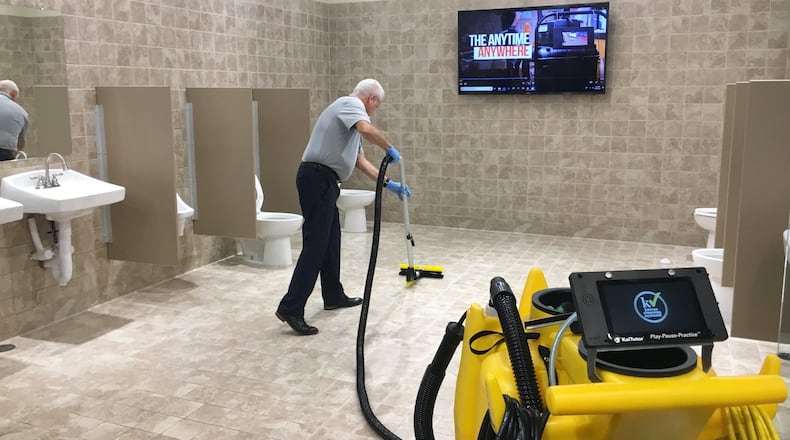“We’re doing for the janitor what the bulldozer did for the ditch-digger,” said Bob Robinson Sr., founder and president/CEO of the company, while giving a tour this week to a group of Lindenwald residents.
Among other things, the company manufactures cleaning machines that use integrated combinations of chemicals, water, high-pressure spouts and vacuum systems to get toilets, floors, kitchens, hallways and other areas much cleaner than with traditional methods, officials said. Floors, for example, are 50 times cleaner afterward than with use of a mop, Robinson said.
The machines include another interesting feature: digital screens that let janitors watch recordings of the most effective techniques to clean toilets without even lifting their seats and other cleaning methods for the equipment.
Kaivac, which split off from Hamilton’s Valley Janitor Supply in 1998, sells its products on every continent except Antarctica. It had a big moment two years ago when it landed the account to supply 4,000 of its cleaning machines for use in each Walmart supercenter store in the country. It also now supplies equipment to clean all Walmart food coolers.
Following Walmart came Target and its stores. Kaivac now has produced a few blue units with the Kroger logo that it will use to show the Cincinnati-based grocery store chain with hopes of winning that account.
Plant manager Roy Breehne noted on his part of the tour for Lindenwald residents that every Kaivac machine in the world was built in Hamilton. The company continues to renovate its large campus of about 240,000 square feet that used to be owned by Pease Co., which manufactured pre-made houses.
The sturdy buildings were constructed during the early 1900s, the 1940s and 1960s. Kaivac bought the property in 2008, a few months before the Great Recession hit, delaying plans to improve the manufacturing plant and create a state-of-the-art headquarters featuring research & development areas, testing facilities and video studios.
Robinson, who owns the company’s large majority with his wife, Carlene, and also with Marketing Vice President Tom Morrison, expressed pride in the fact Kaivac “rescued” the former Pease property by pouring $1 million to it and what had been deteriorating roof areas.
The complex also has chemical storage areas that it uses to blend its own trade-secret cleaning liquids.
The Kaivac facility isn’t the only one in Lindenwald returning to life. Darana Hybrid, which uses its electrical and mechanical engineering skills to build conveyors and other small-package-handling systems for clients like Amazon, relocated its operations from Memphis into a former industrial plant at 903 Belle Ave.
A healthy percentage of employees — 25-30 percent — can walk to work from nearby homes, company officials noted.
As Robinson showed off the company’s video studio, he told his Lindenwald neighbors the company employs people from a variety of fields with impressive skills.
“This little company is doing big-boy stuff,” he said.
And Hamilton is pleased to have them.
“They’re quite a company,” said city Economic Development Director Jody Gunderson. “I’m very impressed.”
“They’re very talented people that are problem-solvers,” he added, somewhat amazed that the company, because of the low-key personalities of its owners, doesn’t have a higher profile locally. “They might want to puff their chest out a little bit more, given the fact that they definitely are innovators in the field of cleaning. They’ve grown from a very small operation to something very impressive in Hamilton.”
One thing that impressed Hamilton City Council Member Matt Von Stein about Kaivac and its operations was “they moved into the building in 2008,” but business, like that of many others, was harmed by the economy then. ” Kaivac stuck with their plan and came out of the recession clean,” Von Stein said, “which seems fitting for a company such as Kaivac.”
Von Stein added: “I think Hamilton welcomes any company that wants to do business, especially if they are a company who wants to repurpose a historic building made by the men and women of Hamilton in the early 1900s.”
Council Member Kathleen Klink, who also has toured Kaivac, said, “All of Hamilton needs to know about Kaivac and their significant impact on our community — a company from Hamilton, Ohio doing business around the world.”
Also, she said, “Knowing 30 employees walk to work each day is unbelievably positive for both Lindenwald and Kaivac.”
About the Author
